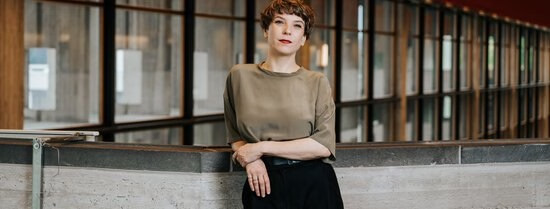Wednesday, March 8, is International Women's Day. The IDEA Center (formerly known as D&I Office) is organizing an event, as it does every year. This year the EUR is highlighting Women in Art during a special action-packed programme at De Doelen. One of the speakers is Dr. Sanne Koevoets, Senior Lecturer in Intersectional Studies of Media and Culture at Erasmus University College and researcher Transformative Repair at EUR's DIT Platform. The IDEA Center spoke to Sanne ahead of the event: "Diversity in media production has increased in recent years, which I very much welcome, but with the increasing danger of algorithms, critical media literacy remains an indispensable skill that we must continue to practice and enhance."
Why is International Women's Day important?
"International Women's Day may sound a little old-fashioned by now. Women's Studies today are called Gender Studies, Intersectional Studies, or Queer Studies. Feminism has increasingly given way to an activism more focused on questioning and sometimes even inflating the categories of 'man' and 'woman.' And that attention to the artificiality of binary gender thinking is important and good. But you can't build a post-gender society on unequal ground. As long as women - or people who identify with some form of femininity - are still judged differently, valued less, and paid less, there is still a world to be won. In many places, a male norm still prevails. A woman in a powersuit is cool; a man in a skirt or dress is not safe on the street at night, and is still not tolerated in the workplace in most places. Therefore, in my eyes, International Women's Day is still as important as it used to be."
What does International Women's Day mean to you personally?
"I think it is especially important on this day to showcase the richness and diversity of 'the feminine.' To stretch the 'category of femininity' from within, by showing how many different ways femininity is lived and experienced by people. As a woman who is always looking for space to relate to femininity in a rebellious way, March 8 is always a special moment."
You are speaking at a special EUR programme at De Doelen on International Women's Day; what will you address in your talk?
"My main message lies in becoming aware that representation of women in films, series and books is something that is not only shaped by creators, but that readers and viewers also play an active role in the way social roles and meanings are interpreted and normalized.
Popular culture is full of stereotypical images and stories, but that doesn't mean you have to resign yourself to them, let alone simply adopt them. By developing a contrarian gaze, you can actively resist stigmatizing or stereotyping media images even as a viewer.
In my talk, I will start from a concept from the early years of feminist art and media studies: the male gaze. This concept makes it possible to analyze how the conventions of classic Hollywood film encourage and normalize a patriarchal gaze. Alfred Hitchcock's blonde ice queens invite the viewer to see women as beautiful, tragic, inscrutable beings who either destroy themselves or their admirers. The beautiful film images are a devious temptation to identify with a specific, limited perspective. That perspective is also still mostly white and heteronormative within the western film tradition. When you become aware of how that normalizing gaze works, you see how the male gaze fixes a white, (heterosexual) patriarchal vision of the world, using fixed conventions. But you don't have to simply accept or adopt that view. By adopting a "contrarian" viewing stance, you can see how power permeates visual media.
What is the status and portrayal of women in art and media?
"I think we live in very interesting times. You fortunately do not only see white people as experts on TV, queer characters are not just seen as funny sidekicks in sitcoms, and women over 50 fortunately appear to exist on TV these days after all. Diversity in media production has increased in recent years, and I very much welcome that. But with the increasing danger of algorithmic tunnel vision, critical media literacy remains an indispensable skill that we must continue to practice and enhance. Only staying in your own filter bubble and only taking in what algorithms determine is dangerous. We must all ensure media literacy and give children tools for this from an early age. We have to keep developing ourselves and keep a critical and contrarian attitude towards the images we are presented with. Make sure you stay open to different perspectives."
The IDEA Center cordially invites everyone to celebrate International Women's Day together at De Doelen on Wednesday, March 8.
- Related content

